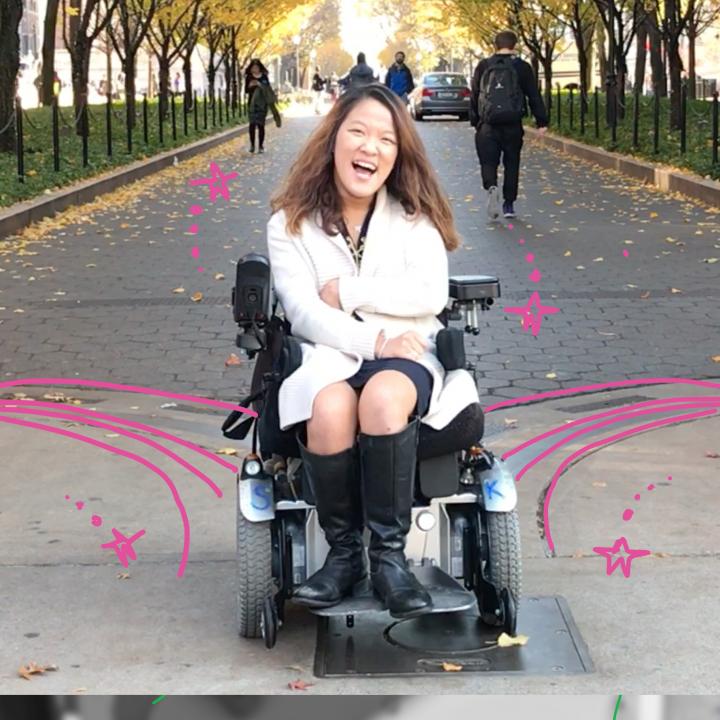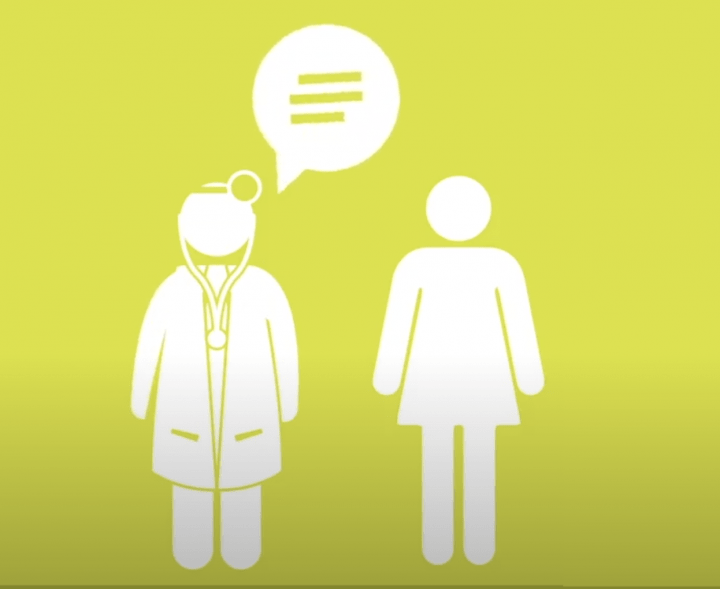Preventive Care for Adults with Cerebral Palsy

What is preventive healthcare?
Preventive healthcare includes health care services like physical exams, screenings, tests, vaccines, and even talking with your doctor about healthy habits. Keeping tabs on preventive care can help you stay healthy, avoid or delay getting sick, and catch problems early when treatment is likely to work best.
An adult with cerebral palsy may have additional health considerations to keep in mind and discuss with healthcare providers.
The Cerebral Palsy Foundation has created a checklist to help guide you in living the healthiest life possible. This checklist has been created for adults with cerebral palsy to provide basic guidance surrounding routine and additional screenings that should occur as part of your primary and preventative care. All adults should follow the same general health screening guidelines to stay healthy, but individuals with CP may need to do other things as well to ensure long term health and wellness.
Which basic preventive care services do adults need?
There are healthcare services that all adults need whether or not they have cerebral palsy.
| Annual Wellness Visit: | Every Few Years: | At your visit, remember to talk to your doctor about: |
|---|---|---|
|
CDC Vaccination Schedule: https://www.cdc.gov/vaccines/schedules/index.html |
|
Important topics to discuss with your provider:
- Routine Screenings and Blood Tests
- Aging and Function
- Mental Health
- Pain and Sleep
- Nutrition, Medication, Supplements
- Physical Activity and Fitness
- Women's Health
What blood tests and screenings should I discuss with my PCP and why:
- Adults with cerebral palsy may have some additional risk issues that should be monitored over time and addressed early if necessary. Your PCP should conduct and manage routine screenings to monitor changes over time.
- Your doctor may include other standard tests as part of the initial physical exam as well. Among them may be blood tests to check electrolytes, liver function, toxicology screening, and kidney function. Because the kidneys and liver are responsible for the elimination of depression medications, impairment to either of these two organs may cause the drugs to accumulate in the body. Additionally, blood work can show if there might be other indicators that could be contributing to feelings of fatigue and depression including thyroid function, vitamin and hormone deficiencies and anemia.
- Additionally, your provider will want to make sure that your immunizations are up to date.
| Blood Pressure Check | If blood pressure is high (hypertension) this can cause conditions such as heart disease or stroke. Adults with cerebral palsy are at higher risk at younger ages than peers without cerebral palsy. |
|---|---|
| Body Mass Index (BMI) |
This screening tool calculates a formula of weight/height to estimate your total body fat. As an adult with CP, it is important to know that some screenings may be misinterpreted by your practitioners. Be Sure to Discuss with your Doctor:BMI may be underestimated in individuals with CP, especially those with more severe forms of CP. This is because individuals with CP tend to have less muscle and more fat infiltration in the muscle architecture. Providers must be sure to properly assess for obesity using Waist-to-Hip Ratio. |
| Bone Mineral Density |
This is a type of X-Ray that looks at bone density to check for bone health which can be impacted for people with cerebral palsy. For individuals with cerebral palsy, these tests should be done at age 21 to provide a baseline for changes of time. There are two types of bone density tests:
As an adult with CP, it is important to know that some screenings may be misinterpreted by your practitioners. Be Sure to Discuss with your Doctor:Bone Fragility: Fractures can be common in cerebral palsy and can lead to further complications and functional declines. Both Bone Mineral Density and Bone Size are important when assessing fracture risk. Individuals with CP can be at risk for poor bone mineral density, leading to progressive deformity regardless if they walk independently or not. However, individuals who primarily use wheelchairs have more challenges with bone fragility and fractures. |
| Colonoscopy |
This is a routine check for all adults to screen for colon cancer (beginning at age 45 - then every 5 to 10 years thereafter, or earlier if your health and family history indicate the need for earlier screening. Ask your PCP for a referral to the appropriate healthcare professional. |
| Metabolic Panel |
This is a blood test that measures blood sugar (glucose), electrolyte and fluid balance, kidney function and liver function. Waist-to hip-ratio is another simple way to evaluate risk for metabolic disease. As an adult with CP, it is important to know that some screenings may be misinterpreted by your practitioners. These may include:Chronic Kidney Disease: People with cerebral palsy may be at higher risk for kidney disease, and the tests used to measure this misinterpreted. Persons with cerebral palsy often have less muscle, which can lead to lower levels of creatinine - a waste product in the body that comes from normal wear and tear on the muscles. Everyone has creatine in their bloodstream, and in addition to muscle mass, it is affected by a person's age, gender, race and body size. Make sure your practitioner reviews the results of your metabolic panel with an understanding that the results of one value (GFR) may not be accurate because you have CP. GFR stands for glomerular filtration rate and is a routine lab test reported on the group of tests called metabolic panel. The GFR is used by your healthcare provider to look to see if you have kidney disease, but it may be normal, even if you are developing kidney disease, because it is calculated using a creatinine level that starts lower do to the CP. |
If you are experiencing changes in function, you may be asking yourself, "Is my cerebral palsy getting worse?" The answer is: No your cerebral palsy is not getting worse, although it may sometimes feel like it! For individuals with CP, the initial injury to the brain that caused CP is not getting worse, but the effects on the body of aging with cerebral palsy may have caused differences in the way your bones and muscles developed.
Additionally, if you have limited mobility and have a primarily sedentary lifestyle, it is important to keep a close eye on possible spinal complications, osteoarthritis, cardiac, kidney, and other diseases at an earlier age. With age, you may also want to have conversations with your healthcare provider if you experience declines in mobility, increased pain, and other concerns.
If you are experiencing:
- Declines in mobility
- Changes in bowel or bladder function or control
- Sensation
- Balance issues and risk of falls
- Fine Motor Skills such as hand writing
These can be signs of spinal compression or other conditions and it is very important to discuss these symptoms with your provider.
There are screening tools that can be used to help your healthcare provider assess changes in function you might be experiencing. These include:
| Screening for Cervical Stenosis and/or Lumbar Stenosis | Urodynamics/bladder control | Cardiovascular disease |
|---|---|---|
|
This is done with an MRI and should be done beginning as early as age 40 if indicated.
|
The management of urinary function is important and there are many ways to address issues with bladder control and continence. It is important to manage bladder function to prevent kidney disease, as well as social issues and quality of life. |
Changes in cardiac capacity impact the health and function of all adults. People with cerebral palsy often don't get enough aerobic exercise to keep their heart and cardiovascular system healthy. Simple measures of aerobic capacity can help your healthcare provider make the recommendations for all ability levels that can improve cardiovascular function. |

It is important for your PCP to screen for mood disorders such as depression, anxiety, and thought, personality or behavioral disorders. Your provider can help refer you to the best mental health resources if indicated.
If you are feeling sad or blue, or are having difficulty sleeping, you should request a mental health screen from your PCP. These can range from simple questionnaires that your doctor will ask you to fill out to more in-depth standardized measures that help identify mental health issues.
Many adults with and without cerebral palsy report mental health concerns and concerns with depression, anxiety and social isolation - now more than ever. Having cerebral palsy can increase this risk and it is important to share your concerns with your primary healthcare provider. You are not alone and there are many treatment options that include talk therapy, medication and other options. Often mental health is impacted when there are changes in function, or pain and fatigue issues, so it is important to conversations with your healthcare provider in order to optimize your mental health. Mental health services are available and accessible more than ever with telehealth options.
Chronic pain is a common issue for adults with cerebral palsy and can impact all area's of one's life, as well as increase the risk of mental health issues. Pain for cerebral palsy should be treated by a specialist familiar with the different types of pain (pain as a result of growing up with cerebral palsy and/or having many surgeries, poor biomechanics; or more generalized pain that may be associated with fibromyalgia; or neuropathic pain).
Far too frequently pain in individuals with CP is treated with opioids, which may not be appropriate for the type of pain that someone experiences and may increase the risk of addiction.
If you are experiencing pain, it is important that your pain is diagnosed and treated correctly by a trained healthcare provider who specializes in pain management and has experience with adults with permanent conditions like cerebral palsy.
People with cerebral palsy often have questions regarding their energy levels and sleep quality. Be sure to discuss your sleep habits and any concerns you have with your primary healthcare provider including:
- Difficulty falling or staying asleep
- Leg Spasms
- Breathing Issues
Additionally, you should let your provider know if you are fatigued throughout the day, and/or if your energy levels interfere with your ability to work or impact your quality of life. There may be ways to help, including Sleep Therapy, which includes an evaluation and treatment plan by a trained specialist.
Be sure to talk with your provider about your nutrition and healthy eating to ensure that you are getting enough of the appropriate vitamins and nutrients for your physical needs.
If necessary ask to be referred to a nutritionist and/or a weight management specialist.
Talk to your PCP about the medications and supplements that you currently take, and any new ones that you may need to consider. Discuss how these medications and supplements may interact with each other and what you need to know.
Before you appointment be sure to write down (or use your cell phone to take photos of) your prescriptions, over-the-counter medications, supplements and vitamins you are taking or are having difficulty taking.
Ask you provider:
- Am I taking them correctly?
- Are there any side effects?
- Is there a lower cost option?
If you take medications for mental health issues, make sure to discuss the side effects of these medications. Some medications can impact movement of sleep, which is especially important for individuals with cerebral palsy to be aware of.

Exercise is well known to prevent and treat many of the chronic diseases that all adults face as they age. Exercise and physical fitness are vitally important for people with cerebral palsy to improve quality of life and help prevent declines in mobility, cardiovascular health and mental health.
Talk with your healthcare provider about how to get started or continue to incorporate exercise and fitness into your life. There are many adaptive exercise and fitness resources both online and in your local community to help you get and stay active throughout your life

Women have unique health needs and seeing your provider each year is important for maintaining your health. Ask your PCP for a referral to the appropriate healthcare professional for well woman screenings and ask if there are clinicians who have experience with women with CP and/or other physical disabilities.
During your appointment your provider my recommend or perform:
- Mammogram - Screening for breast cancer (every year beginning at age 45; then every other year beginning at age 55 if indicated)
- Pelvic Exam - Your provider will evaluate reproductive organs to find possible signs of ovarian cysts, uterine fibriods, sexually transmitted infections, or early stage cancers.
- Pap Test - Screen for cervical cancer and is usually performed as part of the pelvic exam
During your appointment is important to have conversations with your provider about birth control and issues with your menstrual period. If you are planning to become pregnant, it is a good idea to have preconception counseling. Your OBGYN or health care provider will ask about diet and life style, your medical and family history, medications you take, and any past pregnancies.

It is important to find a Primary Care Provider who understands you and your unique needs. While not every provider will have experience with Cerebral Palsy, there are many who do and/or have experience with patients who have physical disabilities. Importantly, you will want to be comfortable that your doctor will listen to you and your specific needs, as well as have the qualifications and knowledge you want. Depending on your healthcare insurance plan, there may be a variety of resources to help you select a primary care physician in your area.
If you have a mobility challenge, it’s important to remember that the accessibility of the office and the exam room will be important to you and you want to ask about that before making an appointment.
1. Do you have experience treating individuals with cerebral palsy?
2. Are you and your office staff comfortable treating individuals with cerebral palsy and related disabilities?
3. Are you able to see me for longer appointments if needed, to ensure that all my healthcare needs are addressed?
4. Can your office accommodate my physical needs? (i.e. is there accessible parking, additional space in the exam room for my caregiver if needed, movable exam table, etc.)
5. Are you able to coordinate my care across providers if needed?
6. Do you have a network of specialists you refer to?
7. Does your office have capability to do bloodwork and other procedures "in house" or will I need to visit multiple locations?
Brown MC., Marciniak CM, Garrett Ariane, MG Gaebler-Spira DJ. Diet quality in adults with cerebral palsy: a modifiable risk factor for cardiovascular disease prevention. Dev Med Child Neurol., 2021; 63: 1221-1228. doi:10.1111/dmcn.14913
CDC Immunization Schedule. 2022; https://www.cdc.gov/vaccines/schedules/hcp/imz/adult.html
Gannotti M, Frumberg D. Clinical Therapy Services for Adults with Cerebral Palsy. from F. Miller et al. (eds.), Cerebral Palsy, 2020; https://doi.org/10.1007/978-3-319-50592-3_158-1
Hurvitz EA., Whitney DG., Waldron-Perrine B, Ryan D, Haapala HJ, Schmidt M, Gray C, Peterson M. Navigating the pathway to care in adults with cerebral palsy. Front. Neurol, 2021; 12:734139. Doi:10.33389/fneur2021.734139
Turk MA. Health, mortality, and wellness issues in adults with cerebral palsy. Dev Med Child Neurol 2009; 51 (Suppl. 4): 24-29. Doi: 10.1111/j.1469-8749.2009.03429.x
Whitney DG, Wolgat EM, Ellenberg EC, Hurvitz EA, Schmidt M. The paradoxical relationship between the severity of cerebral palsy and renal function in middle aged adults: better renal function or inappropriate clinical assessment? Disability Rehabil. 2021; Doi:10.1080/090638288.2021.1890841
U.S. Preventative Services Task Force (2022) Adult Preventative Health care schedule: recommendations from the USPSTF A and B recommendations. U.S. Preventative Services Task Force. January 2022; https://www.uspreventiveservicestaskforce.org/uspstf/recommendation-topics/information-for-consumers





